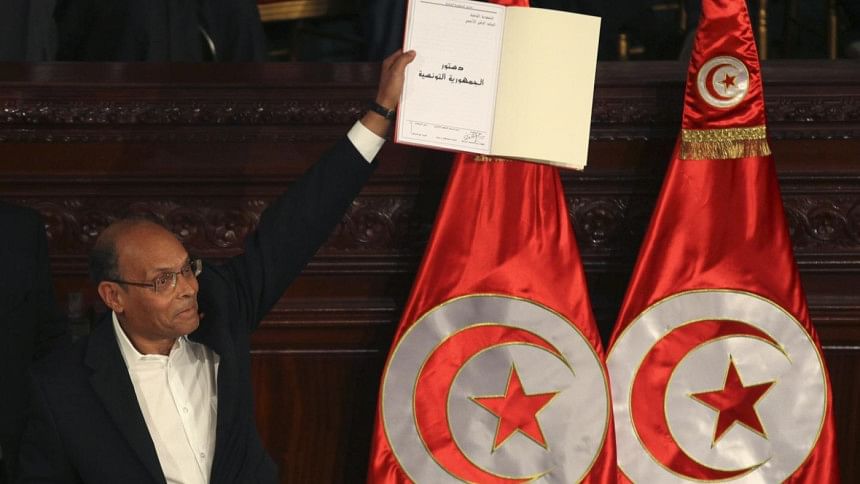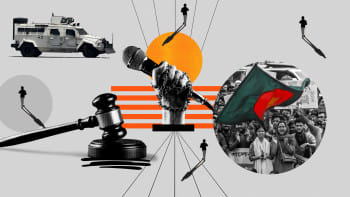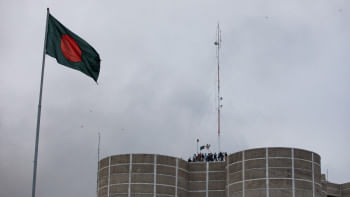What can Bangladesh learn from Tunisia’s experience?

The overthrow of dictator Sheikh Hasina in the recent mass uprising has given rise to new optimism in Bangladesh's long struggle for democratic transition. Learning from the failure of democratic transition after the 90's mass uprising, public opinion has been formed in favour of various institutional reforms including the country's constitution. In this context, lessons need to be learned from the failure and success of institutional reforms in other countries of the world.
The pragmatic and consensus-based politics exhibited by Tunisian political leaders and civil society groups in their struggle for democratic transition can be a good case study, as mentioned in The Tunisian Revolution and Democratic Transition (2022) by Mohammad Dawood Sofi. From Tunisia's experiences of success and failure, we can understand what to do and what not to do in the path of democratic transition.
Tunisian dictator Ben Ali was ousted from power in a mass uprising in January 2011. After that, to break free from the old authoritarian rule and initiate a democratic transition, a decision was made to elect a National Constituent Assembly (NCA) to draft a new constitution. A commission named High Authority for the Achievement of the Revolution Objectives (HAARO), simply known as the Ben Achour Commission, was formed to frame new electoral laws and procedures for the smooth conduct of elections for NCA. The commission with 155 members had a broad representation of legal experts, scholars, civil society organisations, and political parties. Following a free and fair election, a 217-member NCA was elected in October 2011 with representatives of various political parties.
Under the leadership of this elected constituent assembly, several specialised committees were formed to draft the various parts of the constitution, including the preamble, general principles, fundamental rights, government structure, judiciary etc. The committees prepared the drafts by taking advice from many local and foreign legal and constitutional experts. Different social groups including labour unions, women's and human rights organisations also participated in this work providing advice and playing a role in resolving disagreements among political parties on different sections of the constitution. In this way, the draft constitution was finalised based on the active participation and opinions of people from all walks of life and was adopted as the constitution of Tunisia in January 2014 by a two-thirds majority vote in the NCA.
Unlike in Egypt, where two constitutions were quickly drafted by appointed committees with little public debate or input within two years after the Arab Spring, the elected NCA in Tunisia drafted the constitution based on two years of arguments and compromises. This constitution was termed as the most progressive one in the Arab world, in which freedom of expression, religious freedom, and equality of men and women were guaranteed. The 2014 constitution tried to balance the powers of the president and the prime minister. According to the constitution, the ministries of defence and foreign affairs would be in the hands of the president and the remaining ministries would be controlled by the prime minister. The parliamentary election would be based on the proportional representation system. The president would be elected by general, free and direct elections, who would appoint the prime minister consulting with the parliament. The constitution legally mandated the Independent High Authority for Elections (ISIE) which was formed by the NCA in January 2014 by secret ballot and with a two‐thirds majority of the NCA. ISIE has been provided with its own budget, and a provision prohibits the removal of members without specific reasons prescribed by law. ISIE held a series of fair and impartial elections—both parliamentary and presidential—in 2014 and 2019 which furthered Tunisia's democratic transition.
However, the political parties that came to power through these elections could not solve Tunisia's economic, social and security issues. Problems such as unemployment, inflation, corruption and inequality again fuelled public discontent. Added to that were the terrorist attacks of various Jihadi groups. Demonstrations intensified in January 2021 to protest the failure to deal with the Covid pandemic, the economic crisis and police brutalities. Exploiting this public discontent, President Kais Saeed, a retired law professor, who won the 2019 election by a landslide, suspended the parliament and dismissed the prime minister in July 2021. And in doing so, he used Article 80 of Tunisia's 2014 constitution, which empowers the president to take "extraordinary measures" for a specified period of time on matters of national security and sovereignty. But first suspending and then dissolving parliament under Article 80 was unconstitutional as the article mandated that the prime minister and the parliamentary speaker be consulted and that the parliament remain functional during such exceptional measures. Unfortunately, the one body that could adjudicate whether Article 80 was appropriately applied was the constitutional court, which still did not exist due to the inability of the parliament to agree on the court's membership.
Exploiting this situation, President Kais Said drafted a new constitution in June 2022 that would reverse Tunisia's democratic transition. Then in July 2022, in a controversial referendum held in the face of strong objections and boycotts by opposition parties where voter turnout was only 30.5 percent, the new constitution was adopted, effectively transforming the Tunisian government into a presidential autocracy.
Notable among the reasons for this reversal of Tunisia's democratic transition within a decade of the fall of the dictator are: extreme political polarisation, especially between secular and Islamist parties; failure to address economic problems such as inequality, unemployment and inflation; terrorist attacks by various jihadist groups that sway public opinion in favour of authoritarian action; various weaknesses of the constitution including ambiguities regarding the distribution of powers between the prime minister and the president, lack of protection mechanism to prevent misuse of Article 80 of the constitution, weak judiciary, inadequate mechanism for resolution of differences between the president, prime minister and parliament etc. Besides, the 2014 constitution did not give due importance to ensuring various social and economic rights of the people, which acted as a catalyst behind the erosion of the constitution's popularity.
The positive aspect of Tunisia's constitutional reform was the democratic process of drafting the constitution through an elected National Constituent Assembly based on the opinions of people of various ideologies. For this reason, Tunisia was exceptional while many other countries in the Arab world that were freed from autocracy in the contemporary period quickly fell into military rule or civil war. On the other hand, the democratic transition of Tunisia faces major obstacles due to the political divisiveness based on identity and the inability of the political classes to solve the long-standing economic problems such as inequality, unemployment and inflation by utilising the political freedom enshrined in the new constitution.
It is important to learn from this experience of Tunisia as Bangladesh embarks on a democratic transformation journey.
Kallol Mustafa is an engineer and writer who focuses on power, energy, environment and development economics. He can be reached at [email protected]
Views expressed in this article are the author's own.
Follow The Daily Star Opinion on Facebook for the latest opinions, commentaries and analyses by experts and professionals. To contribute your article or letter to The Daily Star Opinion, see our guidelines for submission.

 For all latest news, follow The Daily Star's Google News channel.
For all latest news, follow The Daily Star's Google News channel. 






Comments